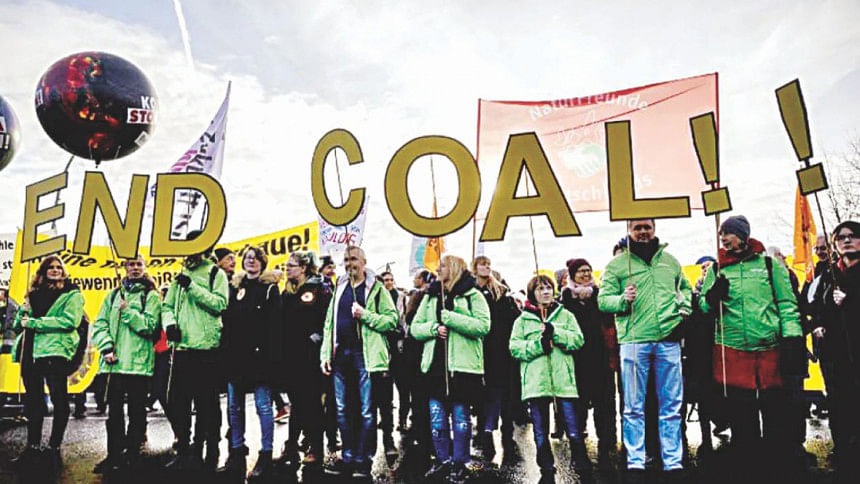A mixed message from Poland

From all accounts, it appears that COP24, the recently concluded climate summit held in Katowice, Poland, was a mixed success. Depending on where you stand on the various issues relating to global warming, and how strongly you feel about them, the conclave was a success, if you are an optimist. On the other hand, one could reach the opposite conclusion if one is a pessimist; in other words, the glass now looks half-empty if one feels that the optimism and the momentum preceding the gathering did not lead to many of the desired outcomes. Nonetheless, this is not the time to sit back and wallow in sorrow but to take inspiration from a statement by UN Secretary-General António Guterres who stressed the need for more work in the future. "From now on, my five priorities will be: ambition, ambition, ambition, ambition and ambition," he said.
The Royal Geographical Society of UK lists "climate change" as the topmost challenge of the 21st century. On its website, 21st Century Challenges, after climate change comes education, hunger, poverty reduction etc. Therefore this list raises a puzzle that we all deal with, i.e. the tussle between what is urgent and what is important. Climate change and its consequences will happen sometime in the near future, and it is the responsibility of the Intergovernmental Panel on Climate Change (IPCC) to send a clear and consistent message to political leaders, civil society and the masses about the priorities and the immediacy of the various actions.
Evidently, the public is receiving confusing signals on climate change. First of all, what does data tell us? Since the Kyoto Protocol was adopted in 1997, greenhouse gas emissions were globally targeted to grow around two percent a year. In recent times, CO2 emissions have been steady for a few years, followed by an uptick in 2017 (1.6 percent) and 2018 (2.7 percent). Ironically, the recent IPCC report which painted a very bleak scenario for global warming was not endorsed by COP24. It is not enough to blame the US, Russia and Saudi Arabia for their "bad behaviour" as the news media has done. These countries have said that the report, and the subsequent one by the experts of the National Climate Assessment (NCA) in the USA, must be reviewed and scrutinised before they are accepted by the global community.
Admittedly, the media is adding to the confusion generated by the recent IPCC and NCA reports. A recent op-ed in the Wall Street Journal entitled "Press is the Enemy of Climate" sounded the alarm against "Press Overreach". After the NCA report was published, some sections of the media announced that the US economy would shrink by 10 percent as a consequence of climate change. For example, CNN reported that "A new US government report delivers a dire warning about climate change and its devastating impacts, saying the economy could lose hundreds of billions of dollars—or, in the worst-case scenario, more than 10 [percent] of its GDP—by the end of the century." Soon, there was pushback and it was demonstrated that the basis for this alarm was a miscalculation. According to the NCA report, the US economy will grow at 1.86 percent annually rather than two percent, a difference of 0.14 percent. The slowdown will happen over the next 82 years, by 2100. While this drop in GDP growth will make it less affluent than it would have been otherwise, the drop in GDP in 2090 is estimated to be USD 500 billion or 2.5 percent of today's economy, according to an estimate done by the New York Times.
Secondly, the news coming from Poland was disconcerting. As reported in the press, delegates to COP24 spent an inordinate amount of time on the language of the Rulebook. However, as one put it, "for a credible and valid rulebook, we need frank conversations about energy transition and compensating the 'losers' of climate policies, such as people working in high-emission sectors."
Conversation, an independent and not-for-profit international organisation, was even more critical. "Clearly, 24 years after the first COP there is a deep disconnect between how urgently the world needs effective climate policy and the pace of discussing global mechanisms on how to abate greenhouse gas emissions."
"We were not able to get the strong endorsement we should have," said Alden Meyer, of Union of Concerned Scientists, an environmental group based in Massachusetts. Economist Jeffrey Sachs, formerly of the Earth Institute at Columbia University, said, "It got translated into many frustrating days of arguing over a few words."
Thirdly, there are new issues that a future climate conference may need to address. Economists in the USA and EU have noted with alarm that changes in market forces and shifts in public opinion have downgraded many initiatives to lower carbon emissions. Against this backdrop, COP24 happened at a time when oil prices are declining again and renewables are finding it hard to stay competitive with fossil fuels.
Professor Ottmar Edenhofer, a former IPCC official and an economist at the Potsdam Institute for Climate Impact Research (PICIR), drew attention to the "fundamental reality" of an oversupply of fossil fuels, which made it "harder for renewables to be cost-competitive with coal." Research at PICIR shows that the "renaissance of coal" continues, using up the available carbon budget within a decade.
The New Yorker noted that delegates arriving at COP24 found that the venue featured walls, floors, soap and even earrings all made from coal. The message was reinforced by Poland's president, Andrzej Duda, who told the delegates, "There is no plan today to fully give up on coal."
Finally, Article 6 of the Paris Agreement stipulated that signatory countries would participate in a global market for trading carbon. However, negotiators failed to reach a deal on the "carbon market", which has been called the "unsung hero" of the Paris pact by Wall Street Journal.
According to various media sources, some Latin American countries are opposing carbon trading because "they see it as a way for richer nations to unfairly and inexpensively transfer the burden of emission cuts onto poorer ones."
The postponement of any action on an international carbon market is an indicator of the difficult path that lies ahead for countries trying to manage their carbon emissions targets. Policy tools that can be implemented without harming the economy are limited in supply. Carbon tax is one of the most important policy instruments that will assist nations to transition to a low-carbon economy. Undeniably, carbon tax, as discussed previously in my column in The Daily Star, is not popular and must be implemented with caution, as the recent riots in France amply demonstrate.
Dr Abdullah Shibli is an economist, and Senior Research Fellow, International Sustainable Development Institute (ISDI), a think-tank in Boston, USA. His new memoir, Fairy Tales: Stories from My Life, will be published by Jonantik soon.





Comments